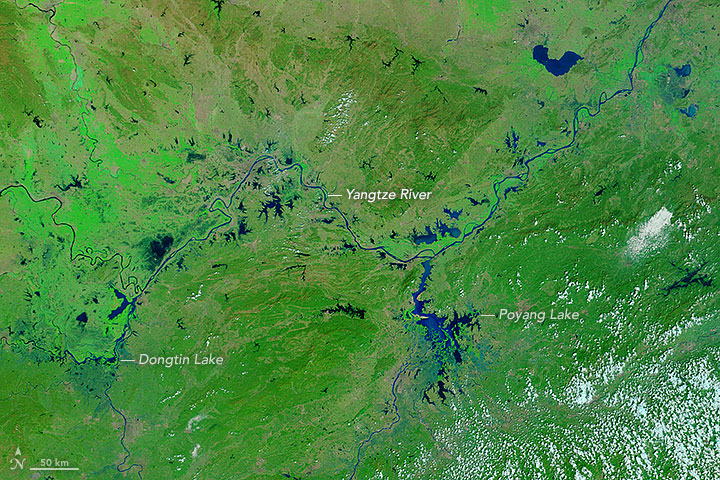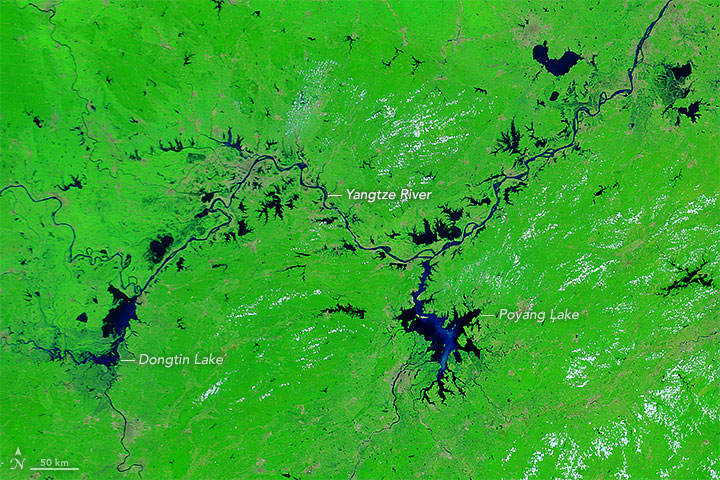2016 summer flooding breaks records across China
Seasonal monsoon of 2016 brought a series of heavy rains to China since June. Torrential downpours broke numerous records to date and caused widespread deadly flooding and landslides. In total, 833 people died, and 233 went missing in weather-related incidents, the highest number reported in the same period since 2011.
Since the monsoon rains began in early June, large portions of China recorded over 200 mm (8 inches) of rainfall in a period of only 24 hours. The area of Macheng in Hubei province reported 285 mm (11 inches). Associated flooding and landslides affected 11 provinces, devastated 40 000 homes, destroyed over 1.5 million hectares of fertile land, and caused the deaths of 128 people by July 5.
72-hr accumulated rainfall as observed by the GPM Core Observatory. Image credit: Google/NASA/JAXA/GPM
Direct economic losses since June reached 253 billion yuan. The provinces of Anhui, Fujian, Guizhou, Hebei, Hubei, Jiangsu, and Jiangxi suffered the hardest strike, according to media reports.
"Torrential rain cut off local communication, power, and traffic, resulting in delayed warnings about the impending deluge, failure to evacuate people in danger and failure to report casualties in time," said Yang Xiaodong, deputy head of the disaster relief department of the China's Ministry of Civil Affairs.
Deadly floods in Hebei have been the strongest in the last 20 years and have caught the local officials unprepared to deal with the disaster. As of July 25, five people have been suspended for dereliction of duty on the occasion, as 130 people died and 110 went missing.

Video credit: CNS TV
''Local governments in Hebei underestimated the intensity of the rain, failed to provide sufficient emergency response, and were late and inaccurate in disaster assessment'', said Yang.
Mid-July brought another spell of heavy rainfall, following the landfall of the Cyclone "Nepartak" over the Fuijan province. Tens of thousands of homes were wrecked, and hundreds of thousands evacuated. At the same time, another storm system arrived across the Yangtze River basin, exacerbating the flooding. Massive floods hit the northeastern China by the end of the month.




The Moderate Resolution Imaging Spectroradiometer (MODIS) on NASA’s Terra satellite captured the Yangtze River Basin on March 27, 2016, and July 28, 2016. The images use a combination of infrared and visible light to increase the contrast between water and land. Vegetated land are depicted by the shades of green; water appears in shades of blue while urbanized areas range from gray to red-brown. Clouds are light blue. The difference in the greenness of the surrounding landscape is due to seasonal growth of vegetation. Image credit: Jeff Schmaltz, LANCE/EOSDIS Rapid Response. Caption by Adam Voiland.
Unusually low levels of water were observed in numerous wetlands, including the Poyang Lake and Donting Lake, during March this year. If water levels were closer to average, the summer flooding would probably be less disastrous. As it is, this season's natural disasters are so far the second most expensive in the country, and the fifth most expensive outside of the US, according to Jeff Masters and Bob Henson, meteorologists from the Weather Underground.


Video credit: MousetvNet


Video credit: worldeyes
The MCA reported that the central government agreed to provide over 1.67 billion yuan to aid those affected, for emergency relocation, resettlement, and reconstruction.
This year's disasters have followed a strong El Niño year, which is not unprecedented. A similar occurrence was reported after the strong weather phenomenon in 1998, as the floods across the Yangtze River Basin caused $44 billion worth damage and killed 3 656 people.
Featured image credit: CNS TV

Surely they are getting what they deserve. They are slaughtering bears and selling their paws.
Chinese in general have NO respect for humans, animal and Mother Nature.